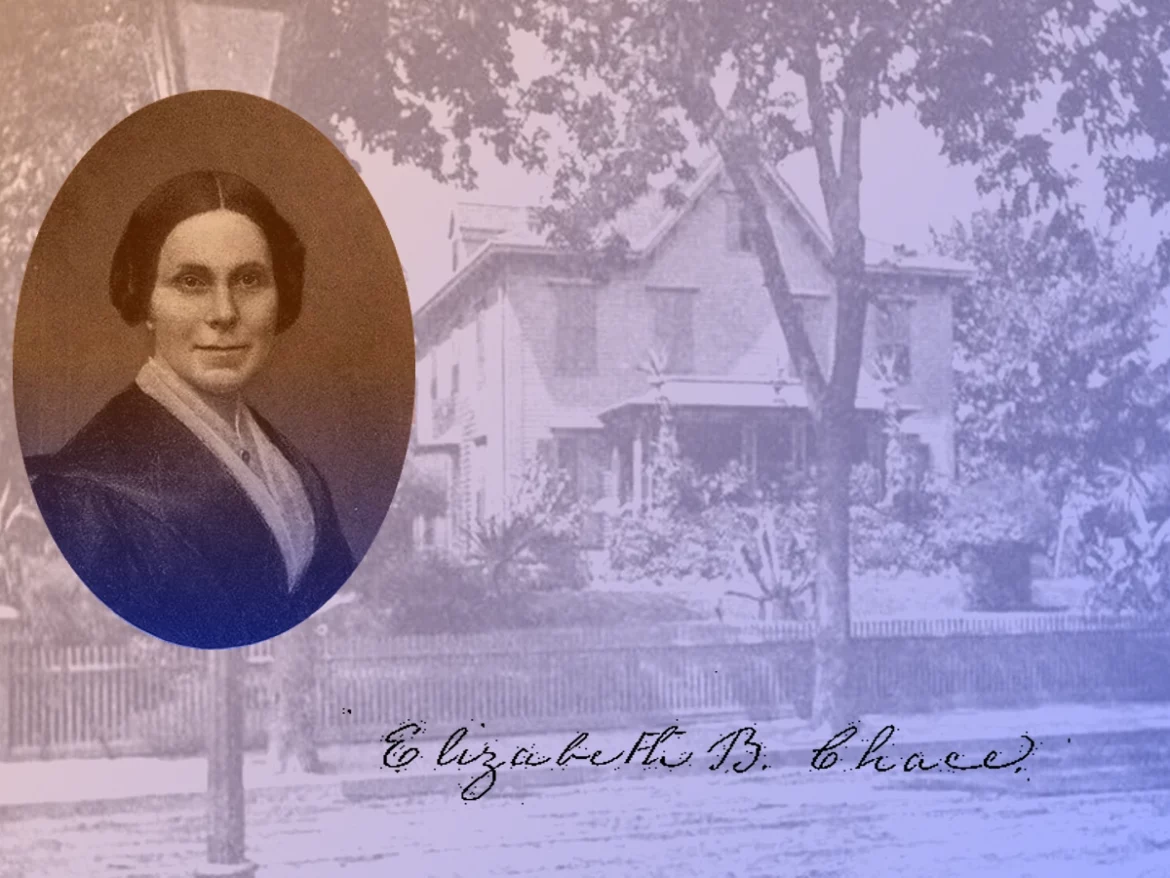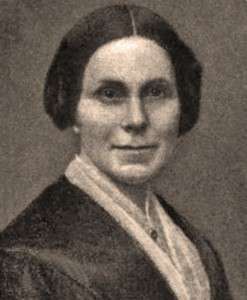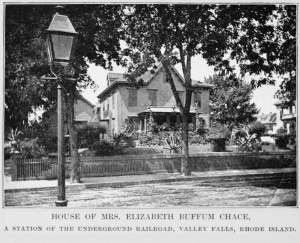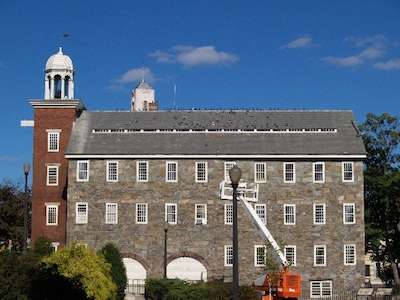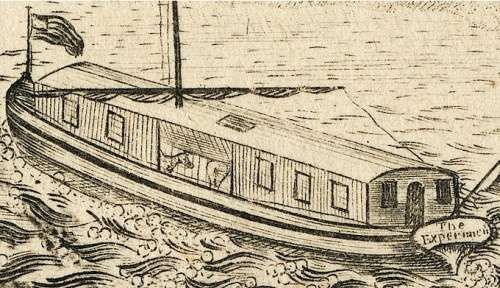Elizabeth Buffum Chace belonged to old and distinguished Rhode Island families, but she was distrusted and shunned because of her ardent opposition to slavery.
Her ancestor Daniel Gould came from England and settled in Newport in 1637. He became a member of the Society of Friends and married the daughter of John Coggeshall, the first president of the Aquidneck Colony who was also a Quaker.
Newport, which is on Aquidneck Island, was a slave market. Between 1709 and 1807, Newport merchants sponsored more than 900 voyages to Africa and brought more than 100,000 slaves to the Americas.
Elizabeth Buffum Chace had reason to believe her Quaker ancestors ‘were somewhat implicated in the African slave trade.’
Quakers couldn’t sanction the practice, though, and by 1727 began to speak out against the slave trade. In 1780, New England Quakers abolished slavery among its members.
An Abolitionist Is Born
Elizabeth Buffum was born on Dec. 9, 1806, in Smithfield, R.I., to Arnold Buffum and Rebecca Gould Buffum.
She described how she came to be an ardent abolitionist in her book, Anti-Slavery Reminiscences, which she wrote at the age of 85.
When her father was a child, she wrote, it wasn’t unusual for slaves from New York to flee to Rhode Island. A slave family escaped and lived on her grandfather’s farm. Arnold Buffum’s opposition to slavery grew stronger as he aged, and he became the first president of the New England Anti-Slavery Society.
Though Quakers officially opposed slavery, they viewed the Buffums with suspicion. They avoided the Buffums because they argued for the immediate abolition of slavery. Many Quakers believed in the gradual abolition of slavery, and that slaves should go to African colonies.
Quaker ministers urged Elizabeth to keep quiet. Her Quaker brother-in-law told her slaves shouldn’t be free because, “I shouldn’t want to see a black man sitting on the sofa beside my daughter.”
At 23, she married Samuel Chace, the son of Oliver Chace, who founded several textile mills. Warren Buffett founded Berkshire Hathaway on the Chace mills. The Chaces were also an old Quaker family strongly opposed to slavery.
Samuel and Elizabeth Buffum Chace moved to Valley Falls, R.I. They then had 10 children after the first five died.
Jim Crow
The Chaces opened their home to abolitionists, including William Lloyd Garrison, Wendell Phillips, Abby Kelley, Frederick Douglass, Lucy Stone.
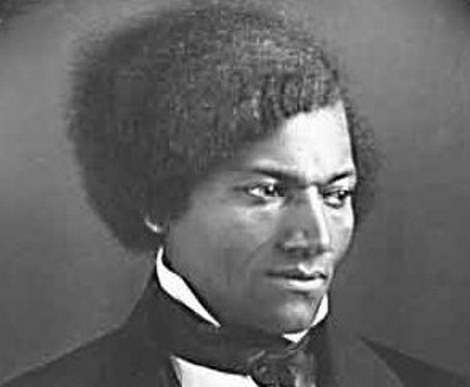
Frederick Douglass
They didn’t just fight slavery, they battled racism. In her book, Elizabeth Buffum Chace described how they stood up to Jim Crow in Massachusetts. As she and her husband entered a railroad car in Taunton,
Samuel Rodman, an Anti-Slavery man from New Bedford, and a highly respectable, well-dressed colored man and his wife, from the same town, took seats therein also. The conductor came and ordered the colored people to leave the car. We all remonstrated, of course, but without avail. He called the superintendent, who peremptorily repeated the order. They got out quietly, and we did the same, (but not so quietly,) and retired to the waiting room, leaving the car empty.
The railroad officials added a car for the African-American couple, and the Chaces joined them. “We found them intelligent, agreeable companions,” she wrote.
Underground Railroad
Samuel and Elizabeth Buffum Chace also became conductors on the Underground Railroad as more and more people escaped slavery.
Often, she wrote, they were carried by small coastal vessels from Virginia at Norfolk or Portsmouth and carried to New England – Fall River, New Bedford and Cape Cod.
In Fall River, they’d find shelter with Nathaniel B. Borden and his wife — Elizabeth’s sister Sarah — and sent in a closed carriage at night,
…with Robert Adams, a most faithful friend as their conductor. Here we received them, and, after preparing them for the journey, my husband would accompany them a short distance, on the Providence and Worcester railroad, acquaint the conductor with the facts, enlist his interest in their behalf, and then leave them in his care, to be transferred at Worcester, to the Vermont road, from which, by a previous general arrangement, they were received by a Unitarian clergyman named Young, and sent by him to Canada, where they uniformly arrived safely.
She used to give them an envelope with her address on it so they could mail it from Toronto to let her know they’d arrived safely.
Midnight Visitors
They were once awakened in the middle of the night by a mother and her two boys. She had escaped slavery in Maryland, moved to Fall River and quietly earned a living as a laundress. A notorious slave-catcher started snooping around her neighborhood asking about her.
Her friends sent her to the Chace’s house in Valley Falls, where they awaited the arrival of her oldest son, who would bring their belongings.
We kept them three or four days, in hourly fear and expectation of the arrival of the slave-catcher; our doors and windows fastened by day as well as by night, not daring to let our neighbors know who were our guests, lest some one should betray them. We told our children, all, at that time, under fourteen years of age, of the fine of one thousand dollars, and the imprisonment of six months, that awaited us, in case the officer should come, and we should refuse to give these poor people up.
Finally, the 17-year-old son arrived with their belongings and money raised by their neighbors in Fall River.
Once, a light-skinned African-American stayed at their house for 10 days pretending to be a fugitive slave. He was actually an escaped burglar. The Chaces found him very well-mannered and entertaining.
After the Civil War, Elizabeth Buffum Chace fought against racial discrimination in the schools and for women’s rights and prison reform.
Elizabeth Buffum Chace died on Dec. 12, 1899. Today , the Elizabeth Buffum Chace House in Warwick, R.I., shelters and aids victims of domestic violence.
Her son Arnold Buffum Chace became a famous mathematician and chancellor of Brown University. Her daughter, Lillie Buffum Chace Wyman, became a prominent author. Two of her grandchildren became renowned professors and another grandson was a U.S. Collegiate Tennis champion and is credited with bringing ice hockey to the United States.
This story about Elizabeth Buffum Chace was updated in 2023.
Image of Elizabeth Buffum Chace PD-US, https://en.wikipedia.org/w/index.php?curid=13709459.
